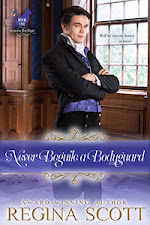I admit it. I prefer my romances to be, well romantic, with
nothing more than sweet kisses, clasping of hands, and the fervent meeting of glances.
But I do believe there is room in the world for romances of a more, er,
passionate nature. Unfortunately, in the nineteenth century, my views would
have been seen as far too liberal, and my books might have been edited to
remove portions unsuited to young audiences. Even the classics like Shakespeare
were deemed too risqué for women and children in some circles.
That’s where Thomas Bowdler came in. He was a physician who
took ill early in his career and decided not to practice medicine any longer.
Instead, he devoted himself to good works, including working for prison reform.
Along the way, he decided it would be good for families to be able to read
Shakespeare and other classics, if only there weren’t so many naughty words and
irreverent concepts in them.
So, in 1807, he published a collection called the Family Shakspeare (which apparently was
the way the name was spelled then), which claimed to have removed any term
thought to give offense to women and children. Included in these terms were curses,
acts of violence such as Ophelia’s suicide in Hamlet, and entire characters with unsavory professions. The book took
a while to gain a following, but as the Victorian period came into full swing,
sales increased. The book saw more than 11 editions by 1850. Some reviewers were
appalled and labeled it pap in its worst form. Others lauded the publication as
making the Bard accessible to a much broader group of readers.
Here is what Mr. Bowdler said to justify the changes:
If a presumptuous artist should undertake to remove a supposed defect in the Transfiguration of Raphael or in the Belvidere Apollo and in making the attempt should injure one of those invaluable productions of art and genius I should consider his name as deserving never to be mentioned or mentioned only with him who set fire to the Temple of Diana. But the works of the poet may be considered in a very different light from those of the painter and the statuary. Shakspeare, inimitable Shakspeare, will remain the subject of admiration as long as taste and literature shall exist and his writings will be handed down to posterity in their native beauty although the present attempt to add to his fame should prove entirely abortive. Here then is the great difference. If the endeavour to improve the picture or the statue should be unsuccessful the beauty of the original would be destroyed and the injury be irreparable. In such a case let the artist refrain from using the chisel or the pencil; but with the works of the poet no such danger occurs and the critic need not be afraid of employing his pen for the original will continue unimpaired although his own labours should immediately be consigned to oblivion.
Interesting argument, no? I’m fairly certain that I would
not have the same tender feelings toward someone “improving” my work. But here’s
something else interesting about Bowdler’s version of Shakespeare.
It appears he didn’t do the editing. His sister did.
Now, if a lady editing a book to remove things no lady
should read doesn’t make you scratch your head, consider this: Henrietta,
called Harriet in her family, was an author in her own right. Perhaps her best
known work, published anonymously, was Sermons
on the Doctrines and Duties of
Christianity, which supposedly went through nearly fifty editions, to the
delight of ministers across the Empire (who had no notion she wasn’t an elderly
clergyman). She was also accorded by some the title of bluestocking, those
well-read ladies who delight in literature. Yet it does not seem to have
troubled her to have changed someone else’s writing, without request or
permission, all in the name of making it more palatable to a group of people.
Slippery slope.
Is it any wonder bowdlerize has come to mean to change a
work, whether book, play, or movie, by removing parts that would offend people?







2 comments:
Charles and Mary Lamb also published Tales from Shakespeare in 1807. The plays were rewritten for children similar to the work of Mr. Bowlder but even more simplified. This book remains popular in library/rare book circles. http://ufdc.ufl.edu/UF00078081
Thanks, QNPoohBear! I knew there were others before and after the Bowdlers. It still boggles my mind. :-)
Post a Comment